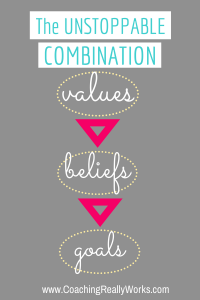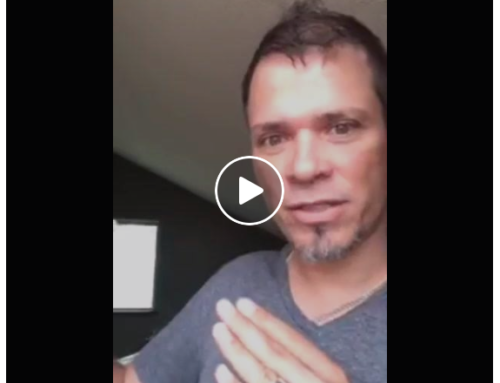I’m thrilled to give you a peek into a coach’s toolkit today. Have you ever wondered how coaches help clients to find sure footing on the path to reaching their goals? Creating alignment in three key areas puts you on a potentially unstoppable course to achieving your desired results.
When aligned, values, beliefs, and goals are a trailblazing trio. [Tweet this!]
Values
It’s not hard to make decisions when you know what your values are.”[Tweet this!]
Roy Disney (Walt Disney’s older brother and financier of his efforts)
In this context values are principles, standards, or qualities a person considers worthwhile or important. What is important in your life, your career, your relationships, your money or any of the many facets of your life? The answer to this question is a personal one and varies greatly from one individual to the next.
For those born into a religious family, they often develop and adopt the values of that religion. The same goes for secular communities or social circles.
Our values develop and adapt as we experience life and change.
Knowing what your values truly are at any given point in time, is an empowering experience.
Core values are the ones that are relevant to all aspects of your life. Dishonoring a core value can often generate stress. For example a person may have core values of contentedness, spending time with loved ones, or bonding. If their work situation demands long hours and keeps them away from their family, this conflict with their values will put a strain on their life over all.
Coaches can help an individual clarify their values and find solutions which bring their lives and actions into alignment with their values.
Values elicitation, is a process that many individuals choose to go through with the help of a coach, which helps them better understand and clarify their values. Initially there may be several values a person is consciously aware of but as they delve further they often find that there are subconsciously held values which carry a high level of importance. Because they are not clear on what those values are it can be difficult to align their behaviors with these values.
When it comes to achieving our goals, it is imperative that they be in alignment with our values. Otherwise we may sabotage our chances for success. In most cases we may do this subconsciously.
Beliefs
Man is made up by his beliefs. As he believes, so he is.”
Johann Wolfgang von Goethe
We don’t hold beliefs. Generally speaking beliefs hold us. We are natural driven by a strong desire to stay true to our beliefs. Whether they are setting goals or pursuing a dream, a person’s beliefs will have a significant impact on actions they will take in order to achieve their desired outcome.
Beliefs can be divided into two broad categories:
- Empowering beliefs are those which support positive action and empower us to move forward. Rather being critical of ourselves, asking constructive questions, is much more helpful.
- Limiting beliefs are beliefs that may be providing some good in our lives such as protecting us from danger, while holding us back from moving in the direction of our goals. Believing that dogs bite could be a helpful belief to keep a child out of danger, but it may deprive them of the benefits of having a pet. By re-framing their belief a child may be able to be freed from that limiting belief and fear of dogs but still be safe.
Consider these statements when identifying limiting beliefs:
- “I knew I’d miss it.”
- “I can’t do that because…”
- “I should be content with what I have.“
- “I knew I’d do that.”
- “Getting money is hard.”
- “This always happens to me.”
- “I never get it right.”
- “Money is evil.”
Changing beliefs can be a profound experience and in many cases is the result of extreme emotional or traumatic experiences. It is possible choose to change your beliefs without such experiences, once we become aware of what our beliefs currently are and clear about the change we desire.
Two commonly used tools for changing beliefs are affirmations or success statements and visualization.
Goals
A goal without a plan is only a wish.”
Antoine de Saint-Expurey
Goals may range from simple one time actions, to sustained ideal levels of achievement or performance, or even the attainment of a possession or experience. There are many systems for setting and clarifying goals. One commonly used tool for evaluating ones goals is to check if they are Specific, Measurable, Achievable, Realistic, and Time-based. They are referred to as S.M.A.R.T. goals.
While being realistic is an important criteria, goals should move you and excite you. Don’t obsess too much over the realistic assessment of your goals, in fact set goals that scare you and move you out of your comfort zone.
Tony Robins outlines a process he calls RPM. You list the Results you plan to achieve, connect with the Purpose behind your goals, and begin at once to take Massive action.
[reminder]What are your core values and how are they being honored in your planning and goal setting? How confident are you that you can reach your goals?[/reminder]
Values
It’s not hard to make decisions when you know what your values are.”[Tweet this!]
Roy Disney (Walt Disney’s older brother and financier of his efforts)
In this context values are principles, standards, or qualities a person considers worthwhile or important. What is important in your life, your career, your relationships, your money or any of the many facets of your life? The answer to this question is a personal one and varies greatly from one individual to the next.
For those born into a religious family, they often develop and adopt the values of that religion. The same goes for secular communities or social circles.
Our values develop and adapt as we experience life and change.
Knowing what your values truly are at any given point in time, is an empowering experience.
Core values are the ones that are relevant to all aspects of your life. Dishonoring a core value can often generate stress. For example a person may have core values of contentedness, spending time with loved ones, or bonding. If their work situation demands long hours and keeps them away from their family, this conflict with their values will put a strain on their life over all.
Coaches can help an individual clarify their values and find solutions which bring their lives and actions into alignment with their values.
Values elicitation, is a process that many individuals choose to go through with the help of a coach, which helps them better understand and clarify their values. Initially there may be several values a person is consciously aware of but as they delve further they often find that there are subconsciously held values which carry a high level of importance. Because they are not clear on what those values are it can be difficult to align their behaviors with these values.
When it comes to achieving our goals, it is imperative that they be in alignment with our values. Otherwise we may sabotage our chances for success. In most cases we may do this subconsciously.
Beliefs
Man is made up by his beliefs. As he believes, so he is.”
Johann Wolfgang von Goethe
We don’t hold beliefs. Generally speaking beliefs hold us. We are natural driven by a strong desire to stay true to our beliefs. Whether they are setting goals or pursuing a dream, a person’s beliefs will have a significant impact on actions they will take in order to achieve their desired outcome.
Beliefs can be divided into two broad categories:
- Empowering beliefs are those which support positive action and empower us to move forward. Rather being critical of ourselves, asking constructive questions, is much more helpful.
- Limiting beliefs are beliefs that may be providing some good in our lives such as protecting us from danger, while holding us back from moving in the direction of our goals. Believing that dogs bite could be a helpful belief to keep a child out of danger, but it may deprive them of the benefits of having a pet. By re-framing their belief a child may be able to be freed from that limiting belief and fear of dogs but still be safe.
Consider these statements when identifying limiting beliefs:
- “I knew I’d miss it.”
- “I can’t do that because…”
- “I should be content with what I have.“
- “I knew I’d do that.”
- “Getting money is hard.”
- “This always happens to me.”
- “I never get it right.”
- “Money is evil.”
Changing beliefs can be a profound experience and in many cases is the result of extreme emotional or traumatic experiences. It is possible choose to change your beliefs without such experiences, once we become aware of what our beliefs currently are and clear about the change we desire.
Two commonly used tools for changing beliefs are affirmations or success statements and visualization.
Goals
A goal without a plan is only a wish.”
Antoine de Saint-Expurey
Goals may range from simple one time actions, to sustained ideal levels of achievement or performance, or even the attainment of a possession or experience. There are many systems for setting and clarifying goals. One commonly used tool for evaluating ones goals is to check if they are Specific, Measurable, Achievable, Realistic, and Time-based. They are referred to as S.M.A.R.T. goals.
While being realistic is an important criteria, goals should move you and excite you. Don’t obsess too much over the realistic assessment of your goals, in fact set goals that scare you and move you out of your comfort zone.
Tony Robins outlines a process he calls RPM. You list the Results you plan to achieve, connect with the Purpose behind your goals, and begin at once to take Massive action.
[reminder]What are your core values and how are they being honored in your planning and goal setting? How confident are you that you can reach your goals?[/reminder]





